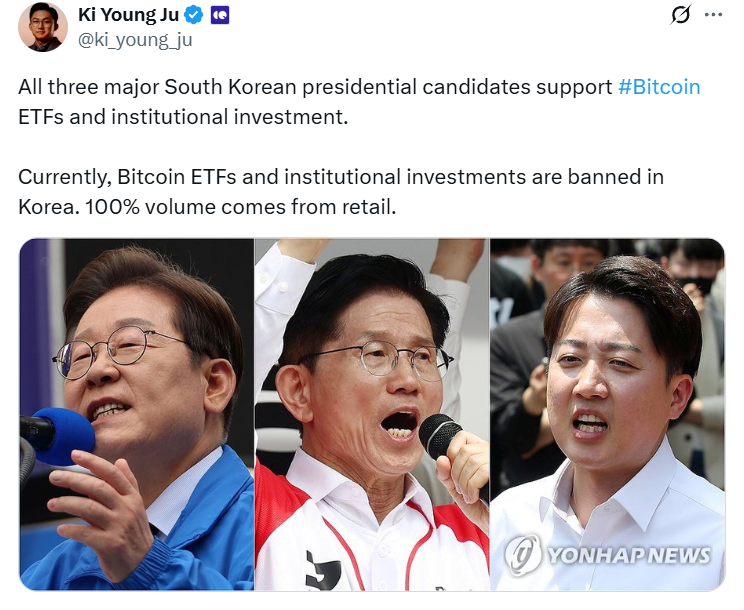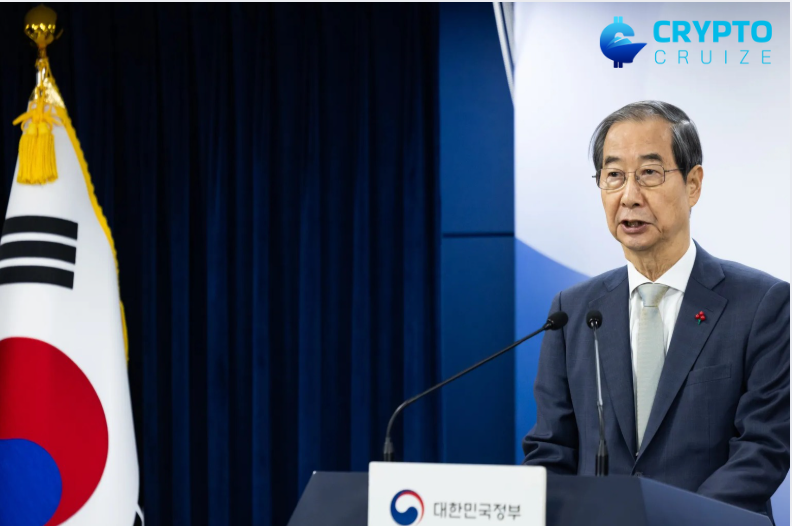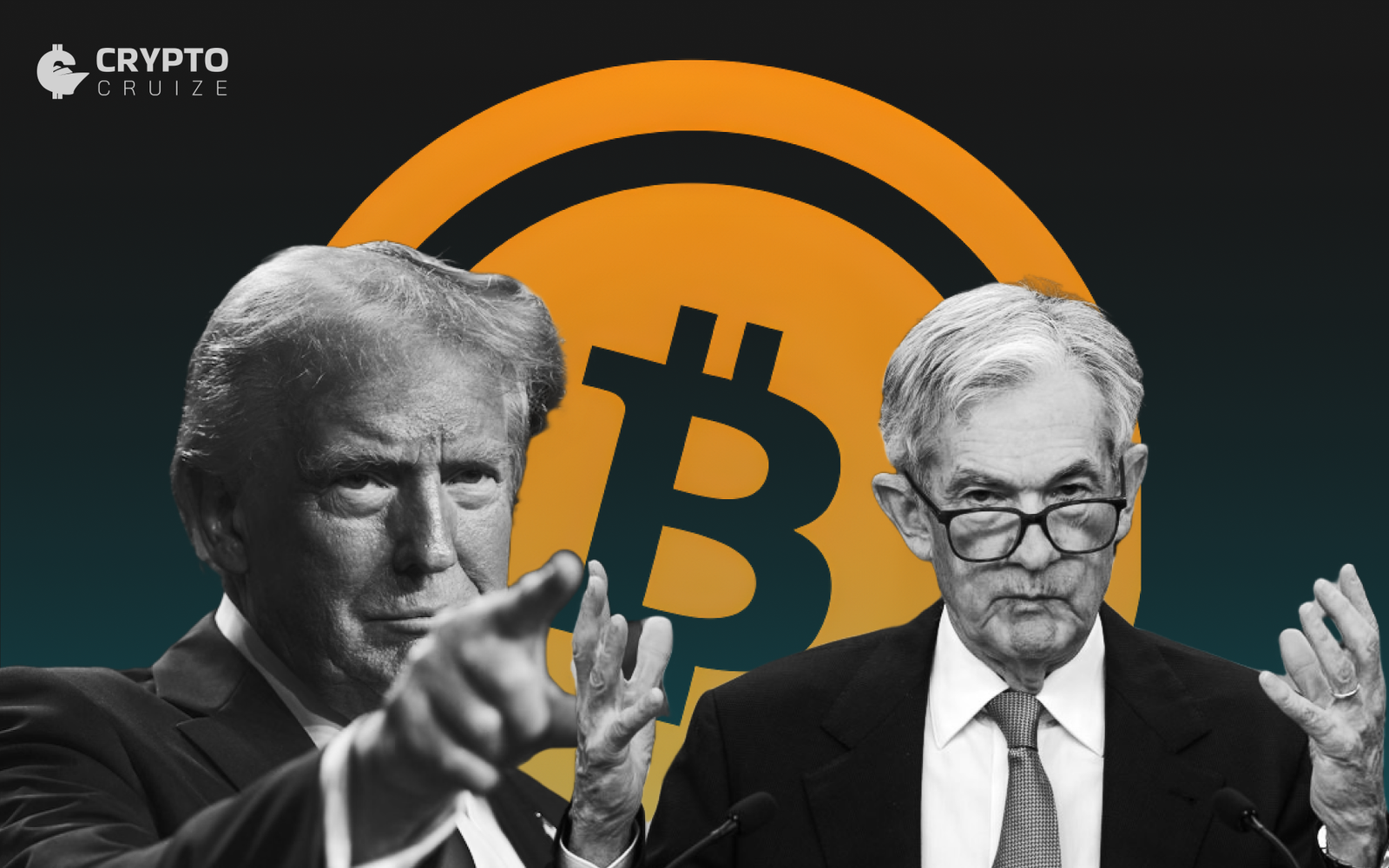South Korea may soon follow the footsteps of Hong Kong in legalising spot Bitcoin exchange-traded funds (ETFs), as all three leading presidential hopefuls have voiced support for institutional investment in cryptocurrencies. However, despite the optimistic rhetoric, previous political promises have left many in the crypto industry cautious about potential regulatory changes.
Unified Support Among Leading Candidates
According to Ki Young Ju, founder and CEO of on-chain data platform CryptoQuant, the top three South Korean presidential candidates have publicly declared their support for Bitcoin ETFs and broader institutional crypto investment. In a post on X dated 14 May, Ju noted that, despite the current ban on such financial products, political support seems strong.
“At present, Bitcoin ETFs and institutional crypto investments are banned in South Korea,” Ju wrote. “That means 100% of the trading volume comes from retail investors.”
This retail dominance in the market has long been a concern for financial experts and crypto advocates who argue that regulated institutional involvement could bring stability and legitimacy to the space.
Democratic Party Pushes Pro-Crypto Agenda
On 6 May, Democratic Party leader Lee Jae-myung reiterated his party’s commitment to legalising spot crypto ETFs, promising to create a safer and more accessible investment environment, particularly for younger generations.
“We will legalise spot crypto ETFs, reduce transaction fees, and establish a secure investment framework so young people can build their assets and plan for the future,” Lee said, as reported by The Korean Economic Daily (KED).

The Democratic Party had previously pledged to support crypto regulation reforms during the 2024 election campaign, including the legalisation of Bitcoin ETFs. However, progress on these promises has been sluggish, leading to public scepticism.
History Dampens Optimism
Despite the recent wave of crypto-friendly statements, experts warn that campaign promises do not always translate into policy. Anndy Lian, an intergovernmental blockchain adviser and author, believes that while the candidates’ stances indicate a potential regulatory shift, past inaction warrants caution.
“Although the candidates are pledging to legalise spot Bitcoin ETFs and reduce investment fees, we must temper our expectations,” said Lian. “They will likely mirror Hong Kong’s approach, but success depends on multiple factors, including market readiness and global sentiment.”
Lian added that the election of a pro-crypto president could help align South Korea with global financial trends, such as those in the United States, where Bitcoin ETFs have already attracted billions in net inflows.
Previous Government Failed to Deliver
Scepticism is further fuelled by the recent history of unmet crypto policy promises. The People Power Party, which came to power in 2022, also pledged to lift the crypto ETF ban and revise the restrictive one-exchange-one-bank rule. However, no progress was made before President Yoon Suk-yeol faced impeachment proceedings.
This failure has cast a long shadow over current campaign promises, raising questions about the actual political will to implement meaningful crypto reform in South Korea.
Hong Kong’s Modest Launch Underscores Challenges
South Korea’s potential move to legalise Bitcoin ETFs comes just weeks after Hong Kong became the first in Asia to approve spot Bitcoin and Ether ETFs. These products began trading on 30 April 2024. However, despite high expectations, early trading volumes were underwhelming when compared to their American counterparts.
Experts suggest that while regulatory support is essential, it does not guarantee strong market performance. Factors such as investor confidence, market education, and global economic conditions will all play a role in determining the success of such ETFs in South Korea.
Outlook Remains Cautiously Optimistic
With presidential support mounting, South Korea may be on the verge of a significant shift in its cryptocurrency policy. But given past delays and unfulfilled promises, both investors and industry stakeholders remain cautiously optimistic. Whether these campaign pledges translate into actual regulatory reform will depend largely on the political landscape post-election and the global momentum surrounding institutional crypto investment.




















































